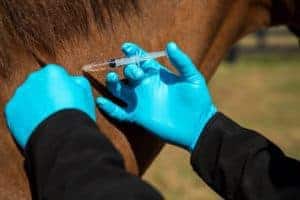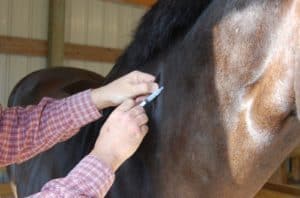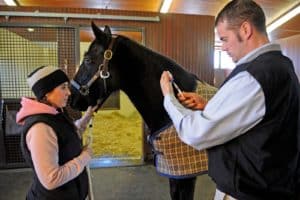
Vaccinating Horses: What, When, and Why?
Regular, strategic vaccination is a safe, effective method to greatly minimize the chances of deadly diseases impacting your herd.

Regular, strategic vaccination is a safe, effective method to greatly minimize the chances of deadly diseases impacting your herd.

Learn more about equine asthma, acute respiratory infections, and shipping fever in horses.

Horses might need additional risk-based vaccines in the fall months, depending on location and activities.

Determining exactly which vaccines a horse needs can be confusing. Here are some basic do’s and don’ts to make sure you’re providing the disease protection your horse needs.

What vaccines should horses have on board prior to show season?

Regular, strategic vaccination is a safe, effective method to greatly minimize the chances of deadly diseases impacting your herd. Learn more in this article from the April 2022 issue of The Horse.

Here’s how to protect your horse from this highly contagious respiratory virus.

Vaccination and quarantine play key roles in controlling infectious respiratory pathogens such as equine influenza virus.

Both affected equids reside at an Oregon rescue facility where 29 more equids were exposed.

Four more horses at the facility are suspected positive.

The Standardbred horses resided at an Edmonton racetrack.

One more horse is suspected as positive, and five more potentially exposed.

The horse, whose vaccination status was unreported, resides at a private facility.

Neither horse was fully vaccinated against EI.

The index case had recently returned from a show in Fort Worth, Texas.

The 2-year-old Quarter Horse had recently returned from a show in Fort Worth, Texas.
Stay on top of the most recent Horse Health news with
© 2022 Copyright Statement dolor sit amet, consetetur sadipscing User Terms, sed diam nonumy eirmod tempor invidunt ut labore et dolore magna aliquyam erat, sed diam voluptua. At vero eos et accusam et justo duo dolores et ea rebum. Stet clita kasd gubergren, no sea takimata sanctus est Lorem ipsum dolor sit amet.
"*" indicates required fields